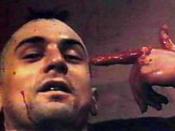Director Martin Scorsese had established himself as a promising filmmaker with his breakthrough film Mean Streets a few years earlier, but with Taxi Driver he exploded onto the scene as a thrilling visionary director. His kinetic, brooding style has never been used better. Through cinematographer Michael Chapman, his camera glides through the hellish streets of New York with the same detached menace as Travis played by Robert De Niro, always adding a remarkable energy to the proceedings, but never getting carried away with visual trickery at the mercy of substance. Martin Scorsese is also a master of the visual comment: in one unforgettable shot, Travis stands at a pay phone, pleading with Betsy to see him again, and the camera drifts slowly to the right, eschewing Travis in favor of an empty hallway, rejecting him from his own movie.
Writer Paul Schrader, is homage to and reworking of cinematic influences, a study of individual psychosis, and an acute diagnosis of the latently violent, media-fixated Vietnam era.
Scorsese and Schrader structure Travis's mission to save Iris played by as a film noir version, aligning Travis with a mythology of American heroism while exposing that myth's obsessively violent underpinnings. Yet Travis's military record and assassination attempt, as well as Palatine's political platitudes, also ground Taxi Driver in its historical moment of American in the 1970s. Employing such techniques as Godardian jump cuts and ellipses, expressive camera moves and angles, and garish colors, all punctuated by Bernard Herrmann's eerie final score, Scorsese presents a Manhattan skewed through Travis's point-of-view, where De Niro's now-famous "You talking' to me" (De Niro) improve becomes one more sign of Travis's madness. Taxi Driver was shot during a New York summer heat wave and garbage strike, Taxi Driver got into trouble with the MPAA for its...


